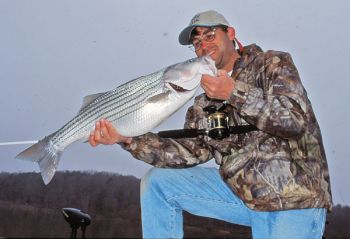
September brings unique challenges and opportunities for striped bass fishermen on Clarks Hill Lake.
The bad news about September on Clarks Hill is that the water is warm — borderline hot — which makes tough customers out of cool-loving striped bass.
The good news is that tough conditions tend to force fish into specific areas of tolerable habitat, in essence “shortening the playing field.” That’s valuable because Clarks Hill (officially J. Storm Thurmond Reservoir) makes for a very big playing field. In fact, at 71,545 acres, it is the second-largest reservoir east of the Mississippi River.
During mid-summer, the habitat gets squeezed for striped bass, especially large ones, and by September, most fish will normally be in the deeper, lower end of the lake, holding at or near the thermocline, where both water temperatures and dissolved oxygen levels tend to be at least tolerable. Last year, the available habitat got so limited at one point that several large stripers died.
Clarks Hill, the furthest downstream of three big impoundments that straddle the Georgia/South Carolina border on the Savannah River, actually contains a mix of striped bass and striper/white bass hybrids. When local anglers talk about “striper fishing” they typically are talking inclusively about stripers and hybrids. Although hybrids are more warm-water tolerant and the two species often will be grouped by type, they favor the same types of areas and eat the same foods, so they quite often are caught together.
Both species are stocked annually, with stocking responsibilities shared by the S.C. Department of Natural Resources and the Georgia Wildlife Resources Division. The U.S. Army Corps of Engineers, which owns and operates the lake, also shares in many fisheries management roles.
“Strong year-classes in recent years are producing good numbers,” according to a fishing report published by the Georgia WRD. “The average striped bass will weigh seven pounds.” The report offered a similarly favorable forecast for hybrids, noting that the hybrids currently average three pounds in Clarks Hill.
To read more on “Earn Your Stripes” from the September 2010 issue of South Carolina Sportsman Magazine, download the digital edition today.

Be the first to comment